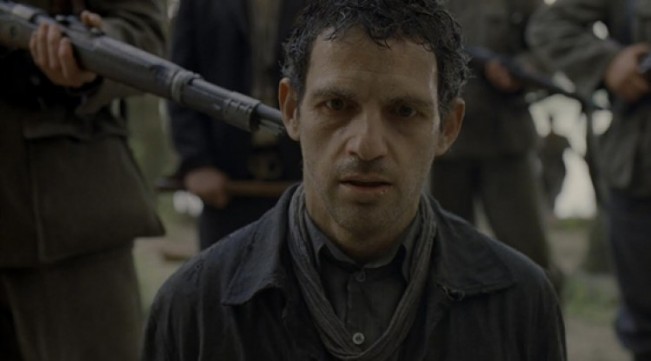By Jake Howell jake.howell@utoronto.ca
Cannes Review: Son of Saul
Sticking with me despite having screened a few days ago is newcomer László Nemes’ Son of Saul, a wild card in Competition that is surely destined for prizes this coming Sunday. This was almost expected, however, as a first feature competing for the Palme d’Or surely speaks to its artistic significance–especially with other vetted auteurs walking the Croisette this year in different programs.

Son of Saul is a heart-wrenching story that literally follows Saul Auslander (unknown Hungarian actor Géza Röhrig), an Auschwitz prisoner working as part of the Sonderkommando, the work detail unit that was responsible at gun point for disposing of gas chamber corpses and cleaning the facilities.
From open to close it’s an incredibly heavy subject for a first feature, and it’s remarkable that the result is a film that doesn’t look or sound like one. Nemes situates his camera primarily in the foreground and behind Saul’s head throughout the harrowing drama, which artfully depicts a man’s attempt to save his son’s body from being cremated. This shallow focus composure is certainly a significant stylistic decision that works well and stands out, but is that why this film is staying with me? I’m not sure it’s that simple.
Call it a gimmick, but there’s a ghostly, haunting vibe here, especially in the production design (and of course the historical substance). You and I have seen other films with a similar setting, but Son of Saul really moves through this concentration camp with an overwhelming sense of urgency and context that is unfamiliar. Time is running out, and it’s never sure who will be disposed of next, and every step the film (and Saul) takes keeps this pace moving until the devastating conclusion.
But this foregrounded focus aesthetic has alienated some critics, and ironically, despite being filmed in 35mm and projected on a bona fide reel as such, Son of Saul has been described here (pejoratively), as a video game, though if I am being honest it seems like an off-handed attempt (by people who most certainly do not play video games) to undermine the film’s minimalist and respectful endeavor by referring it something of a “lesser” medium.
In other words, that criticism is lazy. By only really showing the horrors of the Holocaust in the periphery of the frame, oftentimes just out of focus (do we really need to see this darkness in utter clarity?), there is a painstaking quality to the production that really keeps it from separate, and distinctive, from other World War II pictures. In fact, it’s the restraint of a mature (yet still fresh) filmmaker to not manipulate us like many others would. The takes are long; the stares into pits of fire are even longer. The details in the production are what sell it. The red X painted across Saul’s work outfit marks him and his fate as a target, but speaking broadly this film arrives on the Croisette already attached with one. Thankfully it’s not lost within the memory cracks as the Festival charges on; it’s fundamentally too important for that to happen.













